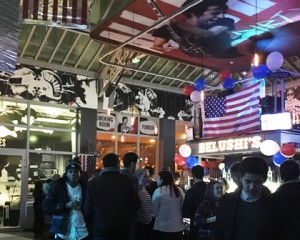
Submitted by Kaitlyn Diehl on the 2016 fall semester study abroad program in Paris, France…
The 6th and possibly most controversial election of my lifetime: Clinton versus Trump. Let’s not delve into my political views on the subject, but witnessing the build-up and conclusion through the eyes of Paris most certainly put an interesting spin on my experience.
One thing that has intrigued me about Europe is the extent to which the U.S. has left a footprint. Here, Obama isn’t just a figurehead, but a personality. In two distinct countries, I’ve seen special “American meals” titled in Obama’s name, and just about every French person I’ve talked to has nothing bad to say about our lame duck president. He’s largely got a reputation abroad as a good leader, but also as the embodiment of “Cool America.” Sure, I was already aware that the U.S. makes a great impact on other countries, but the picture hadn’t become so clear until this experience. Can you imagine ordering a “François Hollande Hot Cake” in the U.S.? Or discussing your adoration for the relationship between Hollande and his girlfriend, Julie, the way I’ve heard Michelle and Barack’s marriage discussed by French citizens? I’m sure a large portion of Americans couldn’t even name the French president. The contrast is astounding.
Not only has our impact become obvious through pop culture, but also through witnessing the amount of attention French media dedicated to the election. In the days leading up to the election, the main news stations featured all sorts of interviews, investigations and on the ground reports. On the day of the election, coverage was almost solely on the race. I have yet to meet a Frenchman that likes Trump, but I’ve also noticed that Europeans are formulating opinions on this election based on the context of current and past issues in Europe. They don’t entirely grasp the political climate in the United States that led to his win.
My host family has had much to say on the matter since day one. Victoria, one of my French “sisters,” is a law student and subsequently has an avid interest in all things political. During the very first meal I ever had with the family, she asked me about my political science major and what I thought of the government in the United States. From then on, politics became a common point of interest between the two of us, and with each conversation it never fails to astound me how well informed she is on the subject of American politics. This is not the exception, but the rule. In discussing the election with various other Europeans, specifically Germans and Swedes, I’ve found that the results are almost as important to them as they are to me. In fact, Victoria once said “Vote the right way, because if France goes down, America is my last hope.” I found this comment intriguing, humbling and terrifying all at the same time. There I was, an American girl who actively sought to leave my country for the brief refuge of Parisian culture, and I was looking into a mirror. Perhaps the grass truly isn’t greener on the other side, though it sure looks like it from a distance.
Among the reactions I’ve seen in the U.S., one of the most common has been “I’m moving to Canada, Europe, etc.” What fascinates me is the fact that this right wing movement does not seem to be a one and done sort of deal: Brexit came first, second came Donald Trump, and now, perhaps, Marie le Pen. I’d heard her name before, two years ago while living in Spain. According to my Andalusian political science teacher, Marie was a dangerous French politician, with extreme, verging on fascist, ideals. He’d stressed that things in Europe were stirring, and now, having returned once more, I can see that he was right. My French host family is terrified of the woman. In order to demonstrate how dangerous le Pen would be, my host sister once said that she would even prefer to have Nicholas Sarkozy again, one of the most controversial and “corrupt” politicians in the game. Marie le Pen is not blind to the current political climate which leans in her favor. On the day after the election, one of the primary French news networks invited her on to discuss the outcome. With my ears attentive, ready to put my improved French comprehension skills to the test, I heard her speak for the first time. “With Brexit, and now with Trump, I think I can do it too,” she said. I do not know enough about Marie le Pen to personally deem her as the devil incarnate, but I know that my host family and my Spanish political science teacher are afraid. Change is in the air, and with this newfound perspective, it’s been easier to see it stirring.

